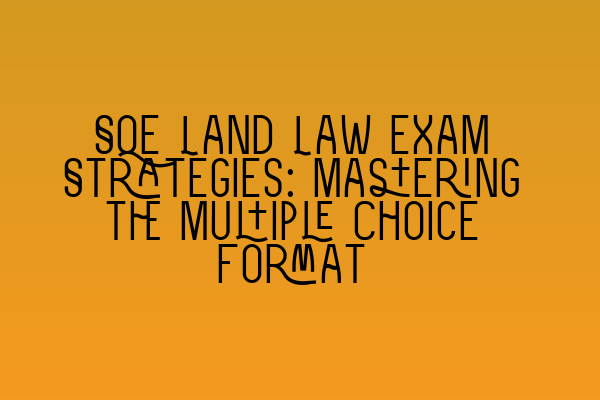SQE Land Law Exam Strategies: Mastering the Multiple Choice Format
Preparing for the SQE Land Law exam can be a daunting task. With so much material to cover, it’s important to have a solid strategy in place that will help you maximize your chances of success. In this article, we will discuss some effective strategies for mastering the multiple-choice format of the SQE Land Law exam.
Understanding the Format
Before diving into exam strategies, it’s crucial to have a clear understanding of the exam format. The SQE Land Law exam consists of multiple-choice questions that test your knowledge and understanding of key Land Law principles and concepts. You will be presented with a question and multiple answer options, and you must select the most appropriate answer.
To excel in this format, it’s important to not only have a solid grasp of Land Law concepts but also practice answering multiple-choice questions under timed conditions. Familiarizing yourself with the format and practicing with SQE 1 Practice Exam Questions can greatly enhance your performance on exam day.
Developing Effective Study Strategies
Now that you understand the format, let’s discuss some strategies for effective study:
- Thoroughly Review Land Law Principles: Start by reviewing the key principles and concepts of Land Law. Make sure you have a clear understanding of the legal framework and principles that govern land transactions and ownership.
- Organize Your Study Material: Break down the subject into manageable sections and create a study plan. This will help you cover all the necessary topics in a structured manner, allowing for better retention and understanding.
- Practice, Practice, Practice: The key to mastering the multiple-choice format is practice. Use practice exams and mock quizzes, such as the SQE 1 Practice Mocks FLK1 FLK2, to familiarize yourself with the types of questions you are likely to encounter. This will not only help you gauge your knowledge but also improve your time management skills.
- Analyze Answer Choices: When answering multiple-choice questions, carefully analyze each answer choice. Look for clues and keywords that can help you identify the correct response. Remember, there may be more than one correct-sounding option, so be sure to select the most accurate and appropriate choice.
- Eliminate Wrong Answers: If you’re unsure of the correct answer, try to eliminate obviously incorrect options first. This will increase your chances of selecting the correct response by narrowing down your choices.
- Manage Your Time: Time management is crucial in the exam. Aim to complete each question within the allocated time frame. If you’re struggling with a particular question, don’t dwell on it for too long. Move on and come back to it later if you have time remaining.
Additional Resources for Success
In addition to the strategies mentioned above, enrolling in SQE 1 Preparation Courses or SQE 2 Preparation Courses can greatly enhance your knowledge and understanding of Land Law principles. These courses provide comprehensive study materials, expert guidance, and simulated exams to help you better prepare for the SQE Land Law exam.
It’s also essential to stay updated with the latest information regarding SRA SQE Exam Dates. Knowing the exam schedule will allow you to plan your study routine accordingly and ensure you are well-prepared on exam day.
Conclusion
The SQE Land Law exam is a crucial step in becoming a qualified solicitor. By understanding the exam format, developing effective study strategies, and utilizing additional resources, you can master the multiple-choice format and increase your chances of success. Remember to practice regularly, analyze answer choices carefully, and manage your time efficiently. With dedication and preparation, you can conquer the SQE Land Law exam and move closer to your goal of becoming a property law expert.
Related Articles:
